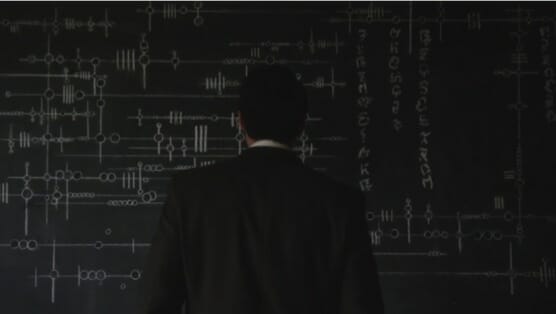Introducing Endless Mode: A New Games & Anime Site from Paste
Previously on Agents of S.H.I.E.L.D. we met a very large man who enjoyed tattooing himself with Coulson’s alien symbols. Putting aside for a moment that this guy looks just enough like Whitehall to make last episode’s stinger that much more confusing, the man is a tank. Not exactly the type of guy you let into your… okay never mind. Apparently he is the sort of guy you let into your home, especially if you’re a memory-erased S.H.I.E.L.D. operative.
Okay, so we don’t know that the character we will later call Janice Robbins (and later after that, Rebecca Stephens) is a memory wiped ex-agent, but the moral ambiguity and possible karmic punishment inherent in messing with people’s minds pretty much makes up the heart of this week’s episode. I won’t break down the plot too much except to say that it’s divided into two storylines, both of which build a great deal of tension, but are still somewhat inert. These are the types of plots that tend to frustrate me with Agents of S.H.I.E.L.D.. This show often mistakes building tension with meandering around a plot point, until the reveal becomes about as obvious as the fact that you’re not going on a second date with a lady who calls herself the Black Widow. But the tension in tonight’s episode sidestepped this pitfall with a fair amount of grace.
I have to attribute this carefully-crafted balance to how personal every issue discussed in this episode was. Tonight marked the return of the memory recovery/cat scan/existence and soul-crushing medical bed from last season. While the excuse to use it is so Coulson can remember more about T.A.H.I.T.I., not much of his time being “tortured” (his word, not mine) actually focuses on finding the information our team is trying to pull out. Instead we see Coulson interact with other GH-325 patients. We see them recovering from the various diseases and disorders that ail them, but we also watch as all six descend into alien scribbling madness. It gets positively Lovecraftian, especially once we’re reintroduced to Tank Man and find that he is carving the symbols into his own skin.
Still much of the focus is not on meeting the first six patients, but on Coulson’s notes and conversations concerning them. A particular standout is his conversation with Dr. Goodman, in which the two discuss ethical and practical steps once it’s clear that all six patients have gone insane. In the end, they decide to continue with the experiments and erase the memories of those harmed by GH-325, but it’s clear this doesn’t sit well with Coulson. Oh man, Son of Coul, if only you knew how much more you’ll regret it once they start getting elbow deep in your own personal brain matter. There is no amount of science bro that can declare this science approved. In the end, Tank is caught and Coulson finally figures out that the alien symbols aren’t a map, but instead the blueprint to some kind of alien city. Where is this city? Why did the alien generating the GH-325 want people to find it so badly? Am I the only one that thinks it has a vague resemblance to Krypton? Who knows? But apparently. just seeing it is enough to cure Coulson of the compulsive symbol carving.
Similarly, the quest to recapture Ward doesn’t focus much on the events that happen during S.H.I.E.L.D. Team Six’s mission. Instead the focus is on Ward himself, and this shines a pretty bright light on the question of whether or not Ward’s actions (primarily using a dead man trigger as a bargaining tool) are those of a hero or a villain. For the most part, Ward is calm, collected, and helpful. If we weren’t a season and a half, and a turncoat reveal in, it would be easy to see him as a victim of circumstance. Still, by keeping the emotional and intellectual focus of Ward’s actions on his rather grey morality, there are no missteps—only opportunities for Ward to show us that he is or isn’t a hero.
In a way that’s what this episode really sets out to convey. What are the actions of a villain or a hero? Is Coulson a hero even if he let S.H.I.E.L.D. continue to inject people with GH-325? Is Ward still a villain, if he helps an overwrought mother with her luggage and captures Mr. Ominious just to leave him for Melinda May to find? This is that Marvel grey-zone morality, which is expressed nowhere better than through S.H.I.E.L.D. There are no easy answers, so we must decide: Can we forgive our villains as easily as we forgive our heroes? And, in the end, should we really be forgiving either one?
Katherine Siegel is a Chicago-based freelance writer and director and a regular contributor to Paste. You can find out more by checking out her website, or follow her on Twitter.
